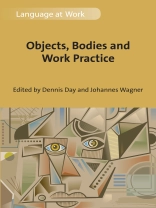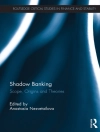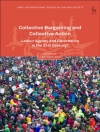What role do material objects play in the in-situ, embodied and spatial circumstances of interaction? How do people organize their embodied conduct with regard to such objects, and how is this consequential in and for their work practices? In this volume, contributors focus on these questions in terms of connections between ongoing courses of interaction within work practices, object materiality and mobility in space, bodily movement and manipulation of objects, and language. The chapters in this book address a broad range of settings and actions (including dressmaking, foreign language teaching, international business meetings and forklift driving) where a variety of objects become relevant.
Table of Content
Introduction. Dennis Day and Johannes Wagner: Objects, Bodies and Work Practice
Transcription Conventions
Part 1: The Role of Objects for the Progressivity of Action
Chapter 1. Maurice Nevile: Objects of Agreement – Placing Pins to Progress Collaborative Activity in Custom Dressmaking
Chapter 2. Anne-Sylvie Horlacher: Workplace Asymmetries and Object-Passing in Hair Salons
Chapter 3. Chiara M. Monzoni, Basil Sharrack, Markus Reuber: Informing and Demonstrating: Manipulating Objects and Patients’ Participation in Shared-Decision-Making
Part 2: Spatial Aspects of Objects in Interaction
Chapter 4. Dennis Day and Gitte Rasmussen: Interactional Consequences of Object Possession in Institutional Practices
Chapter 5. Elwys De Stefani: Ordering and Serving Coffee in an Italian Café: How Customers Obtain ‘Their’ Coffee
Part 3: Objects in the Service of Preparing for a Possible Future
Chapter 6. Trine Heinemann and Barbara Fox: Dropping Off or Picking Up?: Professionals’ Use of Objects as a Resource for Determining the Purpose of a Customer Encounter.
Chapter 7. Maurice Nevile and Johannes Wagner: Objects in Motion: ‘I’m Just Behind You’ and Other Warnings in Forklift Truck Driving
Part 4: Objects as Interactional Accomplishments
Chapter 8. Mie Femø Nielsen: Adjusting or Verbalizing Visuals in ICT Mediated Professional Encounters
Chapter 9. Spencer Hazel and Kristian Mortensen: Designedly Incomplete Objects as Elicitation Tools in Classroom Interaction
Chapter 10. Giolo Fele: Olfactory Objects. Recognizing, Describing, and Assessing Smells During Professional Tasting Sessions
Postscript. Aug Nishizaka: Thing and Space
About the author
Johannes Wagner is a Professor in the Department of Design and Communication, University of Southern Denmark. In recent years he has been working on a comprehensive understanding of human social praxis as the nexus of verbal interaction, embodied practices and tangible objects in the environment.












